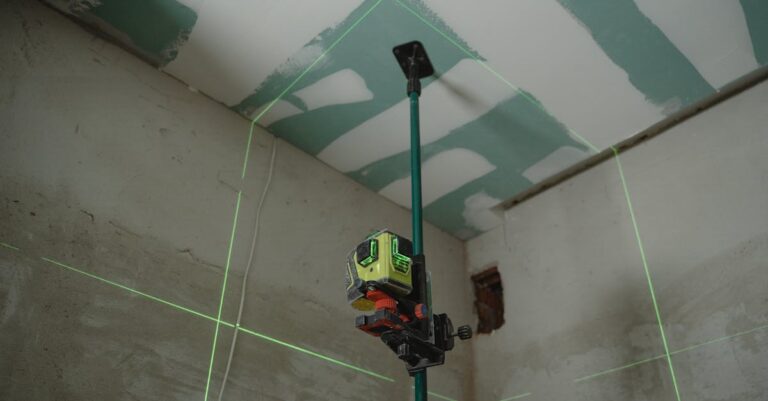In a world where homes are getting smarter than most of us, starting a smart home installation business might just be the golden ticket. Imagine transforming ordinary living spaces into tech-savvy havens where lights respond to a clap and thermostats know when you’re chilly before you do. It’s not just a trend; it’s a lifestyle shift that’s here to stay.
Table of Contents
ToggleUnderstanding the Smart Home Market
Smart home technology has rapidly evolved, shaping how individuals interact with their living spaces. This transformation creates numerous opportunities for businesses in installation and support services.
Current Trends in Smart Home Technology
Smart lighting, security systems, and climate control lead current trends in smart home technology. Home automation systems integrate various devices for enhanced convenience and efficiency. Increasingly, consumers prefer voice-activated assistants, which streamline home management. Wireless technology adoption has surged, enabling seamless device connectivity without extensive wiring. Additionally, energy-efficient solutions appeal to both environmentally conscious consumers and those interested in reducing utility costs.
Target Audience and Customer Demographics
Homeowners in urban and suburban areas represent a significant target audience for smart home solutions. Tech-savvy millennials are particularly drawn to advanced home automation, valuing convenience and efficiency. Families with young children prioritize security devices, enabling peace of mind. Older adults often seek user-friendly technology that enhances safety and independence. Understanding these demographics helps businesses tailor services, maximizing customer engagement and satisfaction.
Essential Equipment and Tools
Starting a smart home installation business requires specific equipment and tools to ensure successful setups and ongoing maintenance.
Must-Have Devices for Installation
Smart hubs facilitate connectivity between devices. Security cameras enhance surveillance and provide peace of mind for homeowners. Smart lights offer energy efficiency and customizable ambiance. Thermostats learn user preferences, optimizing heating and cooling. Voice assistants streamline interactions, controlling multiple systems through simple commands. Each device contributes to creating a cohesive smart home ecosystem.
Tools Required for Setup and Maintenance
Screwdrivers assist in securing devices in place. Wire strippers prepare wires for safe connections. Multimeters measure voltage, ensuring proper installations. Cable testers confirm connectivity and functionality of devices. Drills help install fixtures securely. These tools are indispensable for installation, troubleshooting, and maintaining smart home systems effectively.
Business Planning and Development
Proper planning forms the backbone of a smart home installation business. It encompasses crafting a detailed business plan and addressing legal requirements essential for operation.
Creating a Business Plan
A comprehensive business plan articulates the vision, mission, and goals of the venture. Market analysis should identify trends in smart home technology and potential competition. Financial projections need to include startup costs, expected revenue, and profit margins. Marketing strategies must target specific demographics, focusing on tech-savvy millennials and older adults desiring user-friendly solutions. Additionally, setting measurable objectives allows for tracking progress and adjusting strategies as necessary.
Legal Considerations and Licensing
Legal requirements play a critical role in business operation. Obtaining necessary licenses and permits is crucial for compliance with local regulations. Liability insurance protects against potential risks during installations. Additionally, contracts with clients should outline project scope and services offered to prevent misunderstandings. Staying updated on zoning laws and installation regulations helps avoid compliance issues. Prioritizing these legal considerations ensures a successful and sustainable installation business.
Marketing Your Smart Home Installation Business
Marketing plays a crucial role in the success of a smart home installation business. A clear strategy enhances visibility and attracts clients.
Effective Marketing Strategies
Targeted advertising focuses on the specific demographics interested in smart home technology. Utilizing social media platforms engages tech-savvy millennials and families. Email marketing campaigns can reach out to potential customers with promotions and informative content. Hosting local workshops educates the community about smart home benefits while showcasing expertise. Collaborating with real estate agents enables access to new homeowners seeking smart solutions. Offering referral incentives encourages satisfied clients to promote the business. Combining these methods maximizes exposure and builds a solid referral network.
Building a Strong Online Presence
Creating an informative website establishes credibility and attracts visitors. Essential components include service descriptions, client testimonials, and a blog featuring the latest smart home technologies. Optimizing the website for search engines improves visibility and drives organic traffic. Engaging in social media helps connect with the audience and share relevant content. A regular posting schedule ensures consistent communication with followers. Utilizing online reviews boosts the business’s reputation while simplifying the decision-making process for prospective customers. Together, these efforts foster a robust online presence that promotes growth and client trust.
Providing Quality Customer Service
Providing top-quality customer service in a smart home installation business leads to increased customer loyalty and referrals. Prioritizing responsiveness and clear communication creates a strong client relationship. Satisfied customers are more likely to recommend services to friends and family, enhancing growth potential.
Importance of Customer Support
Customer support plays a crucial role in a smart home installation business. It ensures clients feel valued and heard throughout their experience. Having a dedicated support team available addresses concerns quickly. Customers expect reliable assistance, especially when dealing with complex technology. Professional support reinforces trust and encourages repeat business. Tracking feedback helps improve services based on client needs. Investing in customer support ultimately enhances overall satisfaction and positions a business for long-term success.
Handling Common Customer Concerns
Handling common customer concerns effectively is essential for a successful installation business. Clients often worry about the complexity of devices or the installation process. Providing clear instructions and ongoing support alleviates these fears. Addressing security and privacy issues can help build confidence in smart home technology. Offering troubleshooting tips can assist customers in resolving minor issues swiftly. Showing empathy and understanding during interactions fosters positive relationships. Ultimately, proactively managing these concerns enhances customer experience and bolsters business reputation.
Starting a smart home installation business offers a promising path in today’s technology-driven world. With the right planning and an understanding of market trends, entrepreneurs can tap into a growing demand for smart solutions. By focusing on quality service and effective marketing strategies, they can build a loyal customer base that values innovation and convenience.
Investing in the necessary tools and equipment will ensure successful installations and satisfied clients. Prioritizing customer service and support not only enhances client relationships but also fosters long-term success. As the smart home market continues to evolve, those who adapt and stay informed will thrive in this exciting industry.



